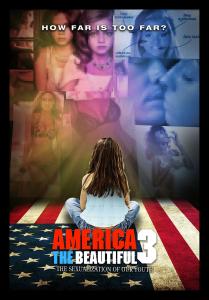
The documentary "America the Beautiful 3: The Sexualization of Our Youth," which is being theatrically released nationwide, is the third in a trilogy of documentaries by writer/producer/director Darryl Roberts. (There is no information regarding whether Roberts also provides craft services and does the makeup.)
These films focus on the harmful effects of the American obsession with beauty. The first one explores the overall quest for physical perfection, and the second explores eating disorders that are associated with efforts to maintain an unhealthy weight.
The following clip, courtesy of YouTube, of the trailer for "Beautiful," provides an excellent sense of the message that Roberts is conveying. It clearly shows that kids who should be emulating Dick and Jane act more like Miley and Robin.
"Sexualization," which turns its lens on the current trend to make children seem alluring years before the appropriate time for doing so, is especially relevant considering the current child molestation scandal surrounding actor Stephen Collins. The scope regarding this topic includes "Toddlers and Tiaras" style beauty contests for elementary-school age and younger girls and sexually suggestive advertising that features pre and barely pubescent models.
Other related topics include segments on clothing retailer Abercrombie and Fitch selling thongs and other adult-oriented "unmentionables" in child sizes and on girls becoming sexually active at arguably too young an age.
Roberts and his panel of talking heads who are experts in their fields do a good job with these topics. They provide a reasonable context regarding the subjects and illustrate their points well with very apt examples from pageants, advertisements, and interviews with girls.
Roberts additionally makes an excellent point regarding children as young as five engaging in mild to hard-core sexual activity being a new trend that arguably reflects the increasing Lolitazation of our society.
The serious flaw with "Beautiful" is that, like the recently reviewed documentary on legalization of marijuana "The Culture High," Roberts casts far too broad of a net.
A HUGE percentage of the virtually countless topics in this roughly 105-minute documentary have little or nothing to do with sexualizing young girls. These extraneous topics include reports on the prevalence of sexual assaults on college campuses, bullying, and a general condemnation of online pornography.
The extraneous topics validly concern affected individuals but have nothing to do with sexualizing young girls. In fact, most of the discussed topics involve women who are at least 18 years old.
Additionally, the criticized behavior predates sexualizing young girls by a century or more. Rape is a horrible crime with a very long history, anyone with a perceived flaw is always at risk of mistreatment by a "stronger" individual, and any "art" form includes a subset of sexually explicit images.
It is equally fair to say that boys (and girls) whose adolescence predates widespread Internet usage have a history of looking through publications that range from lingerie catalogs to adult-oriented periodicals and/or "stag" films or merely enjoying suggestive content in mainstream television or films a little too much. Additionally, the prevalence of such use seems to average out to the same amount over the years.
In other words, viewing pornography is just boys being boys (and girls being girls) in a manner that is healthy as long as it does not trigger harmful effects. Criticizing this activity based on the folks who develop problems related to it is akin to a hypothetical campaign to ban selling ice cream on the grounds that that treat is too tempting for the small percentage of folks who binge on it.
One element of the bullying segment deserves special notice for being absurd on any level. It centers around the successful protest by a teen intern on "Beautiful" regarding a statement by Abercrombie and Fitch that indicates that the company intends that only "cool" kids wear its clothing.
Aside from the lack of ANY indication that clerks at Fitch store are even more discourteous to customers that do not fit the asserted mold than they are to the popular set, it is difficult to imagine how a broad corporate statement can be considered bullying. Even a single individualized communication to an "outsider" that he or she is not welcome at a Fitch store or is asked to stop wearing clothes from that company would make at least an arguable case for the campaign.
If anything, the intern bullies the corporation into issuing an apology for doing no more than showing less sensitivity than many people desire.
Further, the vast majority of us already purchase clothes that reflect our lifestyle and personality but do not experience discrimination if choosing to purchase a garment that does not fit that model (puns intended).
Anyone with questions or comments regarding "Beautiful" is welcome to email me; you can also connect on Twitter via @tvdvdguy.
No comments:
Post a Comment